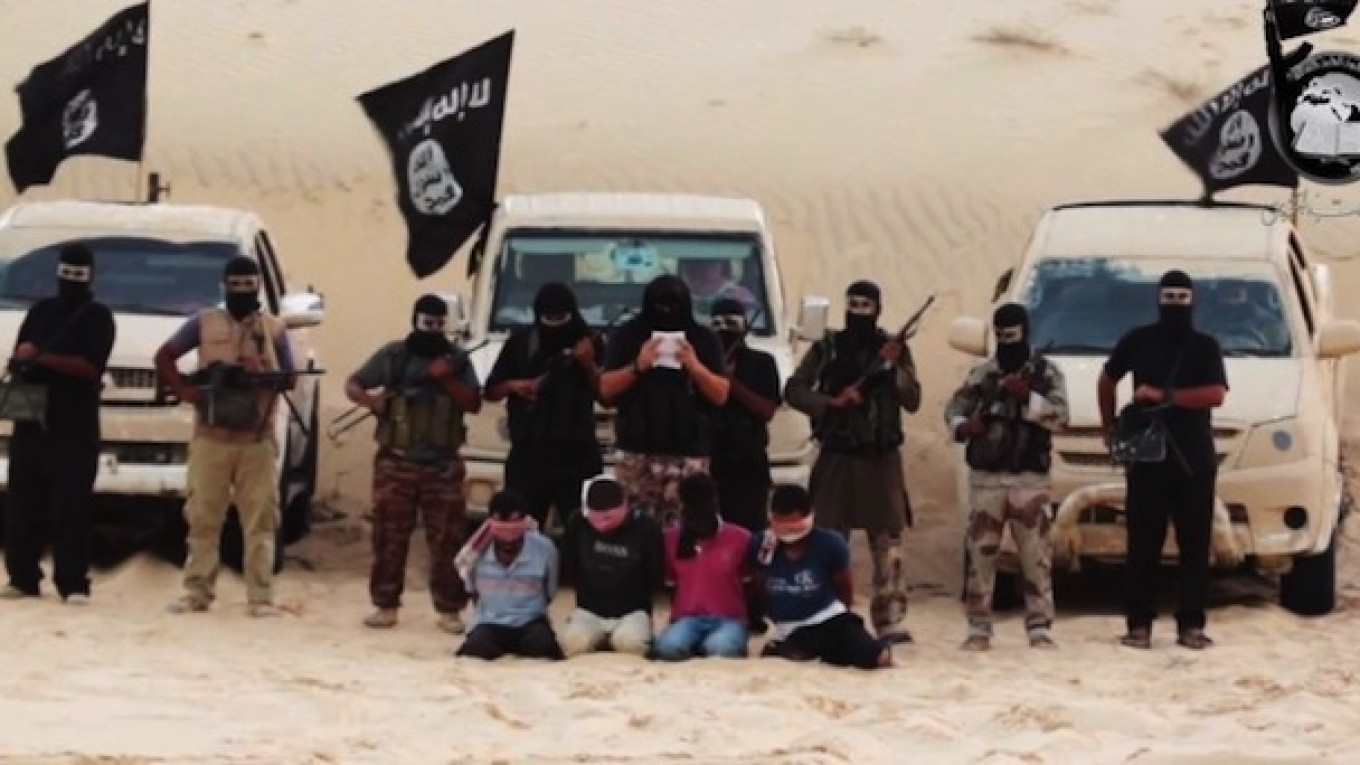More than 1,000 Russian citizens are believed to be fighting alongside the Islamic State, but Moscow is unable to stem the flow of militants to the terrorist group, nor the flow of “volunteers” to separatist forces in eastern Ukraine, a top security official said in an interview published Monday.
Islamic terrorism is “one of the main threats” facing Russia and its former Soviet neighbors, Security Council chief Nikolai Patrushev said in an interview with Kommersant daily.
The other threat, which Moscow sees as carrying “no less danger,” is the supposed “destabilization” brought on by pro-Western political protests of the kind that have led to government changes in former Soviet republic such as Georgia and, more recently, Ukraine, according to the interview.
“It is clear that behind the project of destabilizing that country [Ukraine] is concealed an attempt to create an instrument for radically weakening Russia,” Patrushev was quoted by Kommersant as saying.
He accused the United States of having “initiated” the ongoing crisis in Ukraine, but denied Russia's responsibility by brushing off the fact that the crisis began when Ukraine's previous administration caved in to Moscow's pressure and pulled out of a planned European association deal, prompting Ukrainians who supported the agreement to take to the streets.
Russia had no hand in setting off the crisis, Patrushev said, although he conceded that Moscow did help former Ukrainian president Viktor Yanukovych, clear up his mind about the European deal.
“Ukraine is part of the free trade zone of the [Moscow-led] Commonwealth of Independent States, and Yanukovych simply had the consequences of that step explained to him,” Patrushev said. “He had not taken them into consideration before, and decided to take a timeout to figure out those questions.”
After Yanukovych's government fell, Moscow annexed Crimea from Ukraine under the guise of protecting the peninsula's Russian speakers, and Russia's state-run television channels broadcast continuous reports about the supposed atrocities of Ukraine's new government. But Patrushev denied Russia's responsibility for scores of its young men who have traveled to eastern Ukraine to fight alongside Moscow-backed separatists in the Donetsk and Lugansk regions.
“We do not call for anybody to do that and do not encourage that. But its impossible to really prevent that,” he said, adding that Russia could not shut down its border with Ukraine, as Kiev has urged it to do in order to prevent the inflow of fighters.
Moscow is more concerned about its citizens who join the Islamic State terrorist organization, Patrushev was quoted by Kommersant as saying.
“There have been increasingly frequent cases of the citizens of Russia and Central Asian republics joining the terrorists' ranks,” he said. “Many of them are involved in military action today in Syria. But they will present the gravest danger after returning home.”
Patrushev said he saw “no possibility” of stopping the flow of fighters to the terror group. But he blamed the difficulty on the U.S., which he said maintains “double standards” by fighting the Islamic State while supporting forces opposing Middle Eastern dictators such as Syrian President Bashar al-Assad even though such opposition forces include a heavy Islamist presence.
“That same Islamic State, when it is fighting against [Syria President Bashar] Assad, receives the support of the U.S.,” Patrushev said. “And simultaneously they are bombing it. Until they stop those games, all of this will go on.”
Another top Russian official and close presidential associate, Kremlin Chief of Staff Sergei Ivanov, also blamed U.S. meddling for problems in the Middle East and Ukraine.
“It seems to me that the Americans themselves have understood that the situation in Ukraine is getting out of control, I tell you openly. It is simply getting out of control,” Ivanov told Financial Times in an interview published Monday.
Other examples of out-of-control situations include the fallout of military action in the Middle East and the toppling of dictators such as Libya's Muammar Gaddafi or Iraq's Saddam Hussein, according to Ivanov.
“Hussein was not an ideal ruler, you may think of him whatever you like, and he probably doesn’t deserve the best epithets,” Ivanov was quoted by Financial Times as saying. “But you have to admit the obvious, that during his time, there were no terrorists in Iraq. He hated them and annihilated them, he hung them and shot them, that’s the truth.”
“And what do we have now in Iraq? Libya? They bombed Libya, killed Gaddafi, and what now — has it gotten better?” Ivanov said. “Syria, too, millions of refugees. And every time the situation gets out of control. Here it got out of control, and there, and there as well. And in Ukraine it looks like it is getting out of control as well.”
A Message from The Moscow Times:
Dear readers,
We are facing unprecedented challenges. Russia's Prosecutor General's Office has designated The Moscow Times as an "undesirable" organization, criminalizing our work and putting our staff at risk of prosecution. This follows our earlier unjust labeling as a "foreign agent."
These actions are direct attempts to silence independent journalism in Russia. The authorities claim our work "discredits the decisions of the Russian leadership." We see things differently: we strive to provide accurate, unbiased reporting on Russia.
We, the journalists of The Moscow Times, refuse to be silenced. But to continue our work, we need your help.
Your support, no matter how small, makes a world of difference. If you can, please support us monthly starting from just $2. It's quick to set up, and every contribution makes a significant impact.
By supporting The Moscow Times, you're defending open, independent journalism in the face of repression. Thank you for standing with us.
Remind me later.


